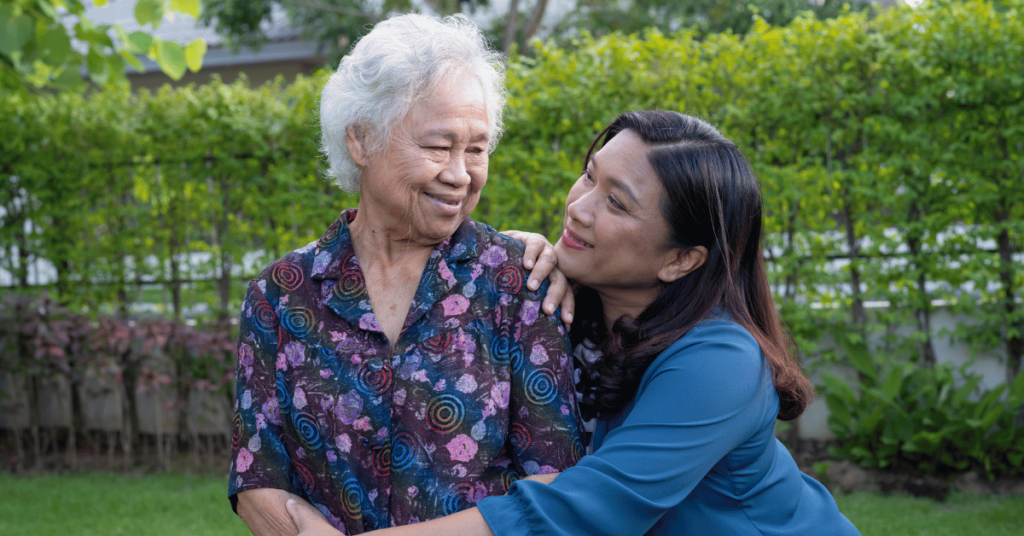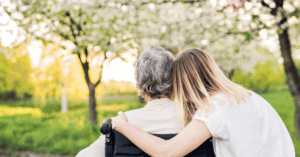Family Day in Canada is a time to celebrate the love and connection we share with our loved ones, especially those who need us most. However, caregiving—whether for a family member or for clients—can bring out a range of emotions, some of which might seem unexpected or even negative at first glance. However, it’s important to remember that “love” has a way of manifesting itself in unexpected forms.
Anger and Conflict as a Sign of Love Hidden Behind Fear
Anger and frustration shouldn’t be seen at face value, as they often stem from a deep-seated fear.
For example, when the person we care for refuses to eat, it’s not merely about the immediate concern—it’s rooted in a deeper fear that this action could signal something much more serious, like the possibility of a new decline or a reminder of losing them in the near future. As caregivers, we have an overwhelming desire to protect those we cherish.
But, in fact, these moments often reflect a deep fear of losing someone precious. It is a reminder that love, in its truest form, is intertwined with vulnerability and the fearful anticipation of loss.
When family caregivers argue with those they care for, or when family members clash with each other, it can seem as though tension has replaced love. In reality, these conflicts usually arise from emotional investment and the fear of making the wrong decisions, rather than a lack of love or concern.
For professional caregivers, who often develop the most intimate relationships with their clients due to the nature of their role, these emotions are not unusual. It’s important to recognize that they, too, are not immune to becoming emotionally attached to those in their care.
This emotional bond is not to be feared but rather understood, as it reflects the deep empathy and connection formed in the process of providing compassionate care. When healthy boundaries are established, this bond can be mutually beneficial, enriching the well-being of both the caregiver and the person receiving care.
Compassion is An Emotion, Not a Skill
Compassion is often seen as a skill that caregivers must develop, but in reality, it’s an emotion—an innate, heartfelt response to another person’s suffering. Unlike a skill, which can be honed and perfected over time, compassion is a deep emotional connection that arises naturally when we recognise the pain or need of others.
What caregivers can learn, however, is how to channel their compassion into actions that provide comfort and support. Part of compassionate care therefore is being able to create an environment where the emotional connection can thrive, helping to reduce feelings of isolation and providing much-needed healing to those in their care.
Re-focusing on Love: Practical Tips for Caregivers
In moments of frustration, fear, or sadness, it’s important to take a step back and reconnect with the love that fuels the caregiving journey.
Step Back, Validate Your Emotions, and Forgive
Caregiving teaches us that time is short, precious, and unpredictable. In the midst of this journey, it’s easy to get caught up in emotions like anger or frustration. But it’s in these moments that we must step back and give ourselves the grace to forgive—both ourselves and others. By doing so, we honour the precious time we have by focusing on what truly matters.
Seek Support and Reach out to Peers
Seeking support and reaching out to peers, whether through support groups or informal connections, can provide validation, comfort, strength, and valuable perspective.
Practice Mindfulness
In moments of overwhelming turbulence, it’s crucial to really try to slow down, pause and focus on your breath. It can be challenging at first, but with practice, it becomes easier. Taking time to be still and centred not only benefits you but also allows you to be more present for your loved one. Focus on the here and now, rather than worrying about what’s to come. By simply focusing on your breath, you naturally bring yourself back to the present moment.
A Special Note to Professional Caregivers: Embracing the Power of Connection
For many individuals living with dementia or other health challenges, family may not always be present—whether due to distance, strained relationships, or the realities of caregiving. In these cases, professional caregivers step into a critical role, not just as providers of care, but as stand-ins for family, offering the connection, comfort, and reassurance that so many need.
As a professional caregiver, the relationships you create with those under your care can have a profound impact on their emotional well-being. Your presence—whether through a smile, a gentle touch, or a listening ear—helps reduce the isolation that many feel when their loved ones are not around. You are providing more than physical care; you are offering a sense of belonging, healing, and connection that no medicine can match.
This is something that transcends the traditional boundaries of professional care—it’s the gift of being human, of offering the love and companionship that everyone, regardless of their condition, deeply needs.
Allow yourself to be open, vulnerable, and receptive to the joy that comes from this exchange. Love, in its purest form, is always reciprocal, and in allowing your heart to open, you may find yourself touched in return in ways you might not expect. The love and joy you give out don’t just benefit those in your care—they also have the power to uplift you, making your work feel not just like a job, but a calling.
As we approach Family Day, let’s focus on love. Love is one of the most complex yet simplest of emotions. It cannot be easily defined or fully understood, only felt. It moves through us in ways that may seem counterintuitive—manifesting in moments of frustration, anger, or even silence. Love doesn’t always look the way we expect, but it is always present, quietly shaping our actions and guiding us through life’s most challenging moments.
Whether you’re a family caregiver or a professional, remember that every difficult moment is also an opportunity to demonstrate love in a new way. By focusing on what you can do in the present, you can transform fear into hope and continue to care with compassion.
Wishing you all a meaningful and Happy Family Day, filled with love, connection, and cherished moments. May you find strength in both the challenges and the beautiful expressions of care that come with being there for those you care for.
At Dementia Solutions, we’ve made it our mission to demystify dementia behaviour and continue to explore person-centred, creative, non-pharmacological solutions to manage dementia-related behaviours. We believe that awareness creation and skill-building through education is the most effective and powerful tool we have to promote and maintain the well-being of both the person with dementia and their caregiver.
If you’re a professional caregiver, consider becoming a Certified Dementia Care Provider!
Ready to deepen your understanding and be confident in your skills in managing changed behaviours due to dementia? Register for our Certified Dementia Care Provider program today and learn how to communicate with compassion, navigate challenging behaviours, and provide the best care for individuals living with dementia. Gain the tools you need to make a meaningful difference in the lives of those you care for. Sign up now and start transforming your caregiving approach!
If you’re a Family Caregiver, we invite you to join our Dementia Solutions Family Membership!
As a family caregiver, you don’t have to navigate the challenges of dementia alone. Join our Dementia Solutions Family Membership today and gain access to expert guidance, practical tips, and a supportive community of caregivers just like you. With resources, real stories, and valuable tools, we’re here to help you provide the best care while maintaining your well-being. Sign up now and take the next step toward confident, compassionate caregiving!
Any questions, simply send us an email at Info@DementiaSolutions.ca , and we’ll guide you through everything our programs have to offer. We look forward to helping you take the next step in your caregiving journey!
If you need support in your caregiving experience or would like to learn more about our educational opportunities, please reach out to us at Info@DementiaSolutions.ca and we would be more than happy to support you.
DISCLAIMER:
The contents of this blog are provided for information purposes only. They are not intended to replace clinical diagnosis or medical advice from a health professional.



